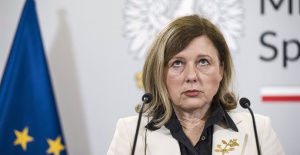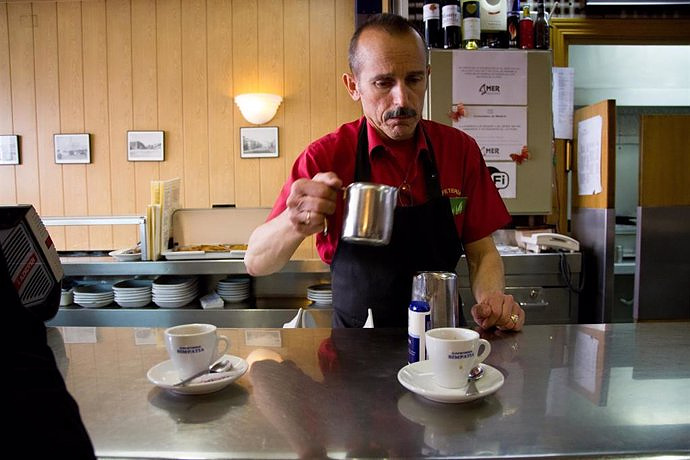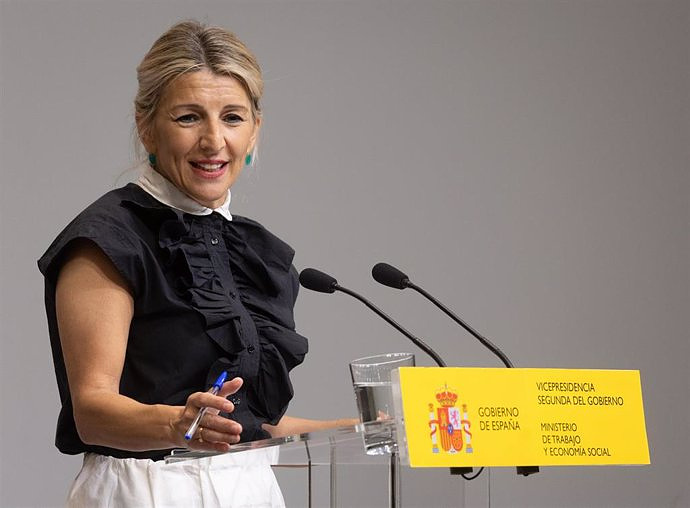Several Western countries, including France and Germany, have accelerated returns in recent weeks.
MADRID, 30 Oct. (EUROPA PRESS) -
Before the summer, an official from the Ministry of Foreign Affairs visited Spanish women linked to the Islamic State who remain in refugee camps in northern Syria in order to establish the conditions for their eventual repatriation to Spain, sources have confirmed to Europa Press. diplomatic.
Said official traveled to the Al Hol and Al Roj camps to be able to "meet with the Spanish citizens who were there" --whose specific number the sources have not specified--, and "establish the conditions to proceed with the repatriation, once the security conditions for it are met".
Little is known about the women and children of Spanish nationality who are in northern Syria after the National Court issued international arrest warrants in September 2019 against four women - three Spanish and one Moroccan - who were in Syria , the country to which they traveled to join the ranks of the Islamic State and who had expressed their willingness to return to Spain. These women had 17 minors in their charge at that time.
In recent months, Western countries, including France and Germany, have intensified the repatriation of their citizens, mainly women and children, trapped in refugee camps in northern Syria, in an effort to deal with the threat that their permanence could represent for the future given the presence of the Islamic State in them.
For now, the Spanish Government has not indicated that it is going to proceed with the immediate repatriation of some of these women and children, although the visit by the Foreign Affairs official could be considered a first step in this regard, although the Executive does not confirm this end.
The Al Hol refugee camp opened its doors in 1991 during the first Gulf War but has gained notoriety after becoming, along with Al Roj, the refuge of many of the last inhabitants of what was once the Islamic State 'caliphate' after the fall of Baghuz, its last stronghold in Syria.
Populated mostly by Iraqis and Syrians, but also by citizens of many other countries, its population has multiplied since then - it is estimated that about 80 babies are born every month - to around 57,000 inhabitants, according to government estimates. Americans. Of these, about 40,000 are minors.
The adult population includes several thousand women who are wives or widows of Islamic State militants. Thanks to them, the terrorist group continues to manage to recruit new fighters for its ranks among the inhabitants of Al Hol, in some cases by force through threats.
"This place is literally a breeding ground for the next generation of Islamic State," US Army Central Command Commander Gen. Erik Kurilla said after visiting Al Hol last September. "Approximately 70 percent of the population is under the age of 12. These young people are vulnerable to radicalization given their poor living conditions," he warned.
Evidence of this threat, CENTCOM reported in September that the SDF had detained some 300 Islamic State operatives during a weeks-long raid on the camp in which 25 grenades and 25 kilos of explosives had also been seized.
NGOs and the UN have repeatedly denounced the situation in Al Hol, which is under the control of the Syrian Democratic Forces (SDF), allies of the United States in the fight against the Islamic State and opposed to the Bashar al Assad regime in Syria. .
In this sense, the NBC network recently reported, citing US Administration sources, that Washington is working with other countries to reduce the population of these camps, linking the repatriations that several European countries have been carrying out with this plan.
According to the sources, the Joe Biden Administration is offering other countries its support in repatriation, including help verifying identities, advising on rehabilitation options, discussing the legal challenges posed by the process, and offering logistical support, such as transfer out of northeast Syria on US military planes.
Earlier this week, Canada proceeded to repatriate two Canadian women, one of whom was detained on arrival at Montreal airport, while Australia removed four women and thirteen minors from Syria, in its first such operation.
Last week, France repatriated 15 women and 40 minors, who were handed over to the services of minors. In the case of the women, three of them were brought before a judge, since there were arrest warrants against them, while the rest were provisionally detained while they are being investigated.
This was the first repatriation by the French government after the Strasbourg-based European Court of Human Rights condemned the state in mid-September for failing to adequately study the cases of two women trapped in camps in northern Syria. and that they wanted to be repatriated. In July, another group repatriation of 16 women and 35 children had already taken place.
Other countries have also carried out repatriations of nationals. Thus, Germany has taken a total of 26 women and 76 minors out of Syria, including seven children and six women at the beginning of October, with which Berlin practically completed the repatriation of its compatriots, while the Netherlands has expressed its intention to repatriate twelve women and 29 children.
The repatriation of children has generally been less of a problem, and in fact some countries first proceeded to remove children who had been orphaned from Syria first, as they are not considered to be in a suitable environment to grow up and also because of the risk of radicalization.
More doubts are generated by the repatriation of their mothers, after the option initially proposed of setting up an international court in the region that could try people linked to the Islamic State was finally ruled out --it is estimated that in northern Syria there are imprisoned some 10,000 men and adolescents, in addition to women in refugee camps--.
As Carola García-Calvo, an expert on terrorism, underlines in an article for the Elcano Royal Institute, "they cannot be considered a monolithic bloc" since some joined the ranks of their own free will but others could have been coerced and not all of them continue to maintain their commitment to the ideology of the terrorist group.
Despite the "difficulties in prosecuting these women in their countries of origin" given the limited ability to obtain incriminating evidence of their activity linked to the Islamic State, experts agree that there is a greater risk that they remain in Syria, where they continue to radicalize and propagate terrorist ideology, than their transfer to their country of origin, despite the risk that once there they may commit attacks, explains the expert.
The key before repatriation, García-Calvo points out, is to first assess the profile of each woman and, in the cases of those who already have pending cases, to respond to justice. In addition, she is committed to "specific programs, with a gender perspective, that favor their deradicalization and effective resocialization" both for those who are incarcerated and those who are not.

 Exploring Cardano: Inner Workings and Advantages of this Cryptocurrency
Exploring Cardano: Inner Workings and Advantages of this Cryptocurrency Seville.- Economy.- Innova.- STSA inaugurates its new painting and sealing hangar in San Pablo, for 18 million
Seville.- Economy.- Innova.- STSA inaugurates its new painting and sealing hangar in San Pablo, for 18 million Innova.- More than 300 volunteers join the Andalucía Compromiso Digital network in one month to facilitate access to ICT
Innova.- More than 300 volunteers join the Andalucía Compromiso Digital network in one month to facilitate access to ICT Innova.-AMP.- Ayesa acquires 51% of Sadiel, which will create new technological engineering products and expand markets
Innova.-AMP.- Ayesa acquires 51% of Sadiel, which will create new technological engineering products and expand markets The Prado will exhibit Caravaggio's 'Ecce Homo' from May 28 after a temporary loan agreement with Conalghi
The Prado will exhibit Caravaggio's 'Ecce Homo' from May 28 after a temporary loan agreement with Conalghi The judge officiates the UCO of the Civil Guard in the case against Begoña Gómez for alleged influence peddling
The judge officiates the UCO of the Civil Guard in the case against Begoña Gómez for alleged influence peddling Brussels sees no more risk for the rule of law in Poland and is preparing to close the sanctioning file
Brussels sees no more risk for the rule of law in Poland and is preparing to close the sanctioning file The PP calls to mobilize on May 26 against the amnesty, the "hoaxes" and the "suspicion of corruption" of the Government
The PP calls to mobilize on May 26 against the amnesty, the "hoaxes" and the "suspicion of corruption" of the Government How Blockchain in being used to shape the future
How Blockchain in being used to shape the future Not just BTC and ETH: Here Are Some More Interesting Coins Worth Focusing on
Not just BTC and ETH: Here Are Some More Interesting Coins Worth Focusing on UMH researchers are working on a high-quality apricot crop that requires less irrigation water
UMH researchers are working on a high-quality apricot crop that requires less irrigation water The UPV develops an application to improve the quality of life of patients with glioblastoma
The UPV develops an application to improve the quality of life of patients with glioblastoma A sensor system obtains the fingerprint of essential oils and detects if they have been adulterated
A sensor system obtains the fingerprint of essential oils and detects if they have been adulterated Faraday UPV presents the 'Origin' rocket to exceed 10 km of flight: "It is the beginning of the journey to space"
Faraday UPV presents the 'Origin' rocket to exceed 10 km of flight: "It is the beginning of the journey to space" A million people demonstrate in France against Macron's pension reform
A million people demonstrate in France against Macron's pension reform Russia launches several missiles against "critical infrastructure" in the city of Zaporizhia
Russia launches several missiles against "critical infrastructure" in the city of Zaporizhia A "procession" remembers the dead of the Calabria shipwreck as bodies continue to wash up on the shore
A "procession" remembers the dead of the Calabria shipwreck as bodies continue to wash up on the shore Prison sentences handed down for three prominent Hong Kong pro-democracy activists
Prison sentences handed down for three prominent Hong Kong pro-democracy activists ETH continues to leave trading platforms, Ethereum balance on exchanges lowest in 3 years
ETH continues to leave trading platforms, Ethereum balance on exchanges lowest in 3 years Investors invest $450 million in Consensys, Ethereum incubator now valued at $7 billion
Investors invest $450 million in Consensys, Ethereum incubator now valued at $7 billion Alchemy Integrates Ethereum L2 Product Starknet to Enhance Web3 Scalability at a Price 100x Lower Than L1 Fees
Alchemy Integrates Ethereum L2 Product Starknet to Enhance Web3 Scalability at a Price 100x Lower Than L1 Fees Mining Report: Bitcoin's Electricity Consumption Declines by 25% in Q1 2022
Mining Report: Bitcoin's Electricity Consumption Declines by 25% in Q1 2022 Oil-to-Bitcoin Mining Firm Crusoe Energy Systems Raised $505 Million
Oil-to-Bitcoin Mining Firm Crusoe Energy Systems Raised $505 Million Microbt reveals the latest Bitcoin mining rigs -- Machines produce up to 126 TH/s with custom 5nm chip design
Microbt reveals the latest Bitcoin mining rigs -- Machines produce up to 126 TH/s with custom 5nm chip design Bitcoin's Mining Difficulty Hits a Lifetime High, With More Than 90% of BTC Supply Issued
Bitcoin's Mining Difficulty Hits a Lifetime High, With More Than 90% of BTC Supply Issued The Biggest Movers are Near, EOS, and RUNE during Friday's Selloff
The Biggest Movers are Near, EOS, and RUNE during Friday's Selloff Global Markets Spooked by a Hawkish Fed and Covid, Stocks and Crypto Gain After Musk Buys Twitter
Global Markets Spooked by a Hawkish Fed and Covid, Stocks and Crypto Gain After Musk Buys Twitter Bitso to offset carbon emissions from the Trading Platform's ERC20, ETH, and BTC Transactions
Bitso to offset carbon emissions from the Trading Platform's ERC20, ETH, and BTC Transactions Draftkings Announces 2022 College Hoops NFT Selection for March Madness
Draftkings Announces 2022 College Hoops NFT Selection for March Madness




























